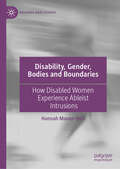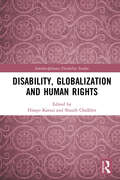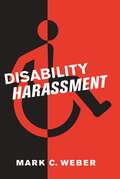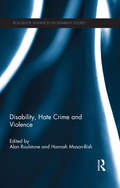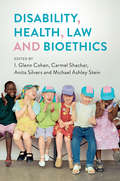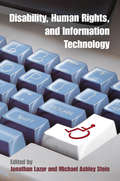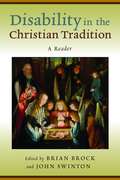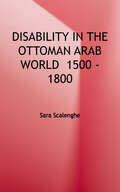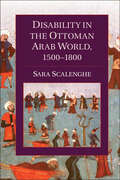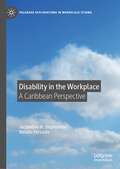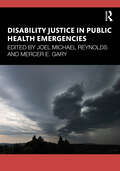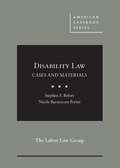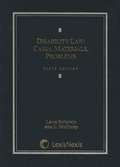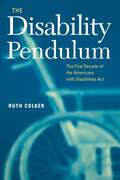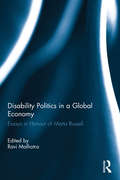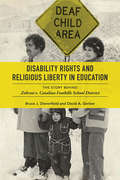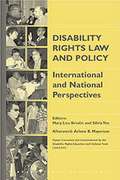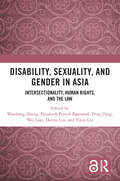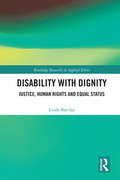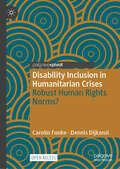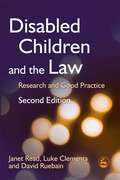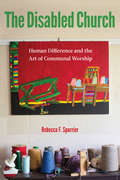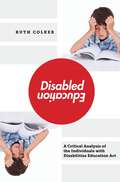- Table View
- List View
Disability, Gender, Bodies and Boundaries: How Disabled Women Experience Ableist Intrusions (Palgrave Hate Studies)
by Hannah Mason-BishThis book outlines the ways that disabled women experience unwanted touching and intrusive questions when navigating public space. Using the framework of feminist disability studies, this book takes an intersectional approach to fill a gap in the understanding of how disability and gender are factors in the nature and impacts of unwanted touching. It draws on research from over 70 women and non-binary people to elicit stories and examples, with some people living what some described as a ‘smaller life’. The methodology was a co-production with a disability activist. This book develops the new concept of Ableist Intrusions to investigate the nature and impacts of such experiences. It considers how non-disabled people should interact with disabled people in order to respect boundaries and bodies.
Disability, Globalization and Human Rights (Interdisciplinary Disability Studies)
by Hisayo KatsuiThe UN Convention on the Rights of Persons with Disabilities has facilitated the understanding that disability is both a human rights and development issue. In order to achieve the Sustainable Development Goals by 2030, the focus on disability inclusion has become increasingly important in the discourse of international and national efforts for "leaving no one behind", the motto of the SDGs. This book discusses pertinent and emerging themes such as disability rights, globalization, inequalities, international cooperation and representation. Evidence which has been obtained tends to show that persons with disabilities have been disproportionately left behind without proper representation, participation and inclusion. This book critically investigates the gaps at different levels, from top to bottom, and as importantly, within the global disability movement, for the realization of global disability rights, and theorizes the intersection of disability, globalization and human rights. Empirical case studies from different countries and contexts are introduced to deepen analysis on theories of critical disability studies from a global perspective. Co-edited by a disability researcher and the former United Nations Special Rapporteur on Disability, this book will be of interest to all students, academics, policy makers and practitioners working to advance the cause of disability rights around the world.
Disability Harassment
by Mark C. WeberBuilding on the insights of both disability studies and civil rights scholars, Mark C. Weber frames his examination of disability harassment on the premise that disabled people are members of a minority group that must negotiate an artificial yet often damaging environment of physical and attitudinal barriers. The book considers courts’ approaches to the problem of disability harassment, particularly the application of an analogy to race and sex harassment and the development of legal remedies and policy reforms under the Americans with Disabilities Act (ADA). While litigation under the ADA has addressed discrimination in public accommodations, employment, and education, Weber points out that the law has done little to combat disability harassment. He recommends that arguments based on unused provisions of the ADA should be developed and new legal remedies advanced to address the problem. Disability Harassment also draws on case law to explore special problems of harassment in the public schools, and closes with an appeal to judges and lawmakers for expanded legal protection against harassment.
Disability, Hate Crime and Violence (Routledge Advances in Disability Studies)
by Alan Roulstone Hannah Mason-BishThis book provides a comprehensive and interdisciplinary examination of disability, hate crime and violence, exploring its emergence on the policy agenda. Engaging with the latest debates in criminology, disability and violence studies, it goes beyond conventional notions of hate crime to look at violences in their myriad forms as they are seen to impact upon disabled people’s lives. Despite a raft of relevant policy and legislation, few have attempted to draw together research on the disabled as victims of hate crime and violence. This innovative volume conceptualizes issues of disability, hate crime and violence and connects empirical research with theoretical insights. Making links between criminal justice policy, social care and welfare, it highlights areas of best practice and makes suggestions for policy and legislative reform. Disability, Hate Crime and Violence is written in accessible language, with minimal jargon and an international focus. Each chapter is grounded in research and practice, with relevant policy and legislation clearly signposted throughout. Disability, Hate Crime and Violence provides a much needed theoretical and practical investigation of the key issues around disabled hate crime and violence. It is an important work for students and academics researching and studying in disability studies, criminology, social policy and sociology, as well as those with an interest in domestic violence studies and broader historical and philosophical constructions of disability, violence and social harms.
Disability, Health, Law, and Bioethics
by I. Glenn Cohen Carmel Shachar Anita Silvers Michael Ashley SteinHistorically and across societies people with disabilities have been stigmatized and excluded from social opportunities on a variety of culturally specific grounds. In this collection, the authors explore the impact that the philosophical framing of disability can have on public policy questions, in the clinic, in the courtroom, and elsewhere. They examine the implications of this understanding for legal and policy approaches to disability, strategies for allocating and accessing health care, the implementation of the Americans with Disabilities Act, health care rights, and other legal tools designed to address discrimination. This volume should be read by anyone seeking a balanced view of disability and an understanding of the connection between the framing of disability and policies that have a real-world impact on individuals.
Disability, Human Rights, and Information Technology
by Jonathan Lazar Michael SteinDisability, Human Rights, and Information Technology addresses the global issue of equal access to information and communications technology (ICT) by persons with disabilities. The right to access the same digital content at the same time and at the same cost as people without disabilities is implicit in several human rights instruments and is featured prominently in Articles 9 and 21 of the Convention on the Rights of Persons with Disabilities. <P><P>The right to access ICT, moreover, invokes complementary civil and human rights issues: freedom of expression; freedom to information; political participation; civic engagement; inclusive education; the right to access the highest level of scientific and technological information; and participation in social and cultural opportunities. <P><P>Despite the ready availability and minimal cost of technology to enable people with disabilities to access ICT on an equal footing as consumers without disabilities, prevailing practice around the globe continues to result in their exclusion. Questions and complexities may also arise where technologies advance ahead of existing laws and policies, where legal norms are established but not yet implemented, or where legal rights are defined but clear technical implementations are not yet established. <P><P>At the intersection of human-computer interaction, disability rights, civil rights, human rights, international development, and public policy, the volume's contributors examine crucial yet underexplored areas, including technology access for people with cognitive impairments, public financing of information technology, accessibility and e-learning, and human rights and social inclusion. <P><P>Contributors: John Bertot, Peter Blanck, Judy Brewer, Joyram Chakraborty, Tim Elder, Jim Fruchterman, G. Anthony Giannoumis, Paul Jaeger, Sanjay Jain, Deborah Kaplan, Raja Kushalnagar, Jonathan Lazar, Fredric I. Lederer, Janet E. Lord, Ravi Malhotra, Jorge Manhique, Mirriam Nthenge, Joyojeet Pal, Megan A. Rusciano, David Sloan, Michael Ashley Stein, Brian Wentz, Marco Winckler, Mary J. Ziegler.
Disability in the Christian Tradition: A Reader
by John Swinton Brian BrockFor two millennia Christians have thought about what human impairment is and how faith communities and society should respond to people with perceived impairments. But never has one volume collected the most significant Christian writings on disability. This book fills that gap. Brian Brock and John Swinton's Disability in the Christian Tradition brings together for the first time key writings by thinkers from all periods of Christian history - including Augustine, Aquinas, Julian of Norwich, Luther, Calvin, Hegel, Kierkegaard, Bonhoeffer, Barth, Hauerwas, and more. Fourteen contemporary experts in theology and disability studies guide readers through each era or group of thinkers, offering clear commentary and highlighting important themes.
Disability in the Ottoman Arab World, 1500-1800 (Cambridge Studies in Islamic Civilization Ser.)
by Sara ScalenghePhysical, sensory, and mental impairments can influence an individual's status in society as much as the more familiar categories of gender, class, religion, race, and ethnicity. This was especially true of the early modern Arab Ottoman world, where being judged able or disabled impacted every aspect of a person's life, including performance of religious ritual, marriage, job opportunities, and the ability to buy and sell property. Sara Scalenghe's book is the first on the history of both physical and mental disabilities in the Middle East and North Africa, and the first to examine disability in the non-Western world before the nineteenth century. Unlike previous scholarly works that examine disability as discussed in religious texts such as the Qur'an and the Hadith, this study focuses on representations and classifications of disability and impairment across a wide range of biographical, legal, medical, and divinatory primary sources.
Disability in the Ottoman Arab World, 1500-1800 (Cambridge Studies in Islamic Civilization)
by Sara ScalenghePhysical, sensory, and mental impairments can influence an individual's status in society as much as the more familiar categories of gender, class, religion, race, and ethnicity. This was especially true of the early modern Arab Ottoman world, where being judged able or disabled impacted every aspect of a person's life, including performance of religious ritual, marriage, job opportunities, and the ability to buy and sell property. Sara Scalenghe's book is the first on the history of both physical and mental disabilities in the Middle East and North Africa, and the first to examine disability in the non-Western world before the nineteenth century. Unlike previous scholarly works that examine disability as discussed in religious texts such as the Qur'an and the Hadith, this study focuses on representations and classifications of disability and impairment across a wide range of biographical, legal, medical, and divinatory primary sources.
Disability in the Workplace: A Caribbean Perspective (Palgrave Explorations in Workplace Stigma)
by Jacqueline H. Stephenson Natalie PersadieThis work critically examines diversity, discrimination, and inclusion in the English-speaking Caribbean nations, with a specific emphasis on persons with disabilities. The chapters include an evaluative analysis on the extant theoretical and empirical literature on persons with disabilities in employment, exploring the nature of their disability, the role of information technology in gaining and retaining employment, and an analysis of the laws and relevant policies which prohibit the discrimination against persons with disabilities in the Caribbean region. Though the enactment of legislation outlawing the discrimination of persons with disabilities is not widespread in the Caribbean, a few select territories have taken positive steps towards recognition of the need to achieve inclusion of persons with disabilities and accept the diversity of the Caribbean populace.After exploring the general state of disability and discrimination in the Caribbean region, the authors analyze workplace accommodations provided to persons with disability, particularly as relations to IT and assistive devices, before focusing on workplace stigmas related to mental health disability and employment law.In addition to literature-based analyses, the book includes qualitative case studies, with the goal of providing benchmarks in organizational responses to employees with disabilities. Further, the authors highlight lessons to be learned from other countries in addressing inequality in the workplace for disabled persons.With its analysis of employment as well as socio-economic and legal issues, this interdisciplinary text will serve as a useful resource in not only understanding the organizational challenges faced by persons with disabilities in the region but also the necessary legislation needed to address discriminatory practices on a wider scale.
Disability Justice in Public Health Emergencies
by Joel Michael Reynolds Mercer E. GaryDisability Justice in Public Health Emergencies is the first book to highlight contributions from critical disability scholarship to the fields of public health ethics and disaster ethics. It takes up such contributions with the aim of charting a path forward for clinicians, bioethicists, public health experts, and anyone involved in emergency planning to better care for disabled people—and thereby for all people—in the future. Across 11 chapters, the contributors detail how existing public health emergency responses have failed and still fail to address the multi-faceted needs of disabled people. They analyze complications in the context of epidemic and pandemic disease and emphasize that vulnerabilities imposed upon disabled people track and foster patterns of racial and class domination.The central claim of the volume is that the ethical and political insights of disability theory and activism provide key resources for equitable disaster planning for all. The volume builds upon the existing efforts of disability communities to articulate emergency planning priorities and response measures that take into account the large body of qualitative and quantitative research on disabled people’s health, needs, and experiences. It is only by listening to disabled people’s voices that we will all fare better in future public health emergencies.The book will be of interest to scholars and graduate students working in bioethics, disability studies, public health policy, medical sociology, and the medical humanities.
Disability Law: Cases And Materials (American Casebook Series)
by Stephen Befort Nicole PorterThis casebook covers disability discrimination under the Americans with Disabilities Act and special education under the Individuals with Disabilities Education Act. It includes statutory text and court decisions in the areas of employment, government services, public accommodations, and education. The casebook incorporates a substantial number of cases decided after the enactment of the ADA Amendments Act. This casebook has a greater focus on employment issues than other casebooks and could support either a stand-alone disability discrimination in employment course or a broad-based disability law course. Each chapter contains streamlined notes and questions designed to provoke thoughtful class discussion.
Disability Law: Cases, Materials, Problems (Fifth Edition)
by Laura F. Rothstein Ann C. McginleyDisability Law: Cases, Materials, Problems takes a broad approach to understanding how disability discrimination laws apply to the kinds of cases attorneys, policymakers, and judges are likely to face. The new Fifth Edition adds analysis and discussion of the ADA Amendments Act throughout the book. It reorganizes and adds new cases and materials in the employment law chapter, including cases on harassment and retaliation based on disability. It also pays more attention to procedural issues (burden of proof), remedies and defenses, litigation and dispute resolution, and insurance. It adds a problem-based approach with chapters and sections of chapters beginning with a hypothetical scenario to be used as a basis for applying the substantive law. It also adds expanded Notes at the end of each section.
The Disability Pendulum: The First Decade of the Americans With Disabilities Act (Critical America #39)
by Ruth ColkerSigned into law in July 1990, the Americans with Disabilities Act (ADA) became effective two years later, and court decisions about the law began to multiply in the middle of the decade. In The Disability Pendulum, Ruth Colker presents the first legislative history of the enactment of the ADA in Congress and analyzes the first decade of judicial decisions under the act. She assesses the success and failure of the first ten years of litigation under the ADA, focusing on its three major titles: employment, public entities, and public accommodations.The Disability Pendulum argues that despite an initial atmosphere of bipartisan support with the expectation that the ADA would make a significant difference in the lives of individuals with disabilities, judicial decisions have not been consistent with Congress’ intentions. The courts have operated like a pendulum, at times swinging to a pro-disabled plaintiff and then back again to a pro-defendant stance. Colker, whose work on the ADA has been cited by the Supreme Court, offers insightful and practical suggestions on where to amend the act to make it more effective in defending disability rights, and also explains judicial hostility toward enforcing the act.
Disability Politics in a Global Economy: Essays in Honour of Marta Russell
by Ravi MalhotraWhile the visibility of disability studies has increased in recent years, few have thoroughly examined the marginalization of people with disabilities through the lens of political economy. This was the great contribution of Marta Russell (1951-2013), an activist and prominent scholar in the United States and best known for her analyses of the issues faced by people with disabilities. This book examines the legacy of Marta Russell, bringing together distinguished scholars and activists such as Anne Finger, Nirmala Erevelles and Mark Weber, to explicate current issues relevant to the empowerment of people with disabilities. Drawing from various fields including Law, Political Economy, Education and History, the book takes a truly interdisciplinary approach, offering a body of work that develops a dextrous understanding of the marginalization of people with disabilities. The book will be of great use and interest to specialists and students in the fields of Political Economy, Law and Society, Labour Studies, Disability Studies, Women’s Studies, and Political Science.
Disability Rights and Religious Liberty in Education: The Story behind Zobrest v. Catalina Foothills School District (Disability Histories #12)
by Bruce J. Dierenfield David A. GerberIn 1988, Sandi and Larry Zobrest sued a suburban Tucson, Arizona, school district that had denied their hearing-impaired son a taxpayer-funded interpreter in his Roman Catholic high school. The Catalina Foothills School District argued that providing a public resource for a private, religious school created an unlawful crossover between church and state. The Zobrests, however, claimed that the district had infringed on both their First Amendment right to freedom of religion and the Individuals with Disabilities Education Act (IDEA). Bruce J. Dierenfield and David A. Gerber use the Zobrests' story to examine the complex history and jurisprudence of disability accommodation and educational mainstreaming. They look at the family's effort to acquire educational resources for their son starting in early childhood and the choices the Zobrests made to prepare him for life in the hearing world rather than the deaf community. Dierenfield and Gerber also analyze the thorny church-state issues and legal controversies that informed the case, its journey to the U.S. Supreme Court, and the impact of the high court's ruling on the course of disability accommodation and religious liberty.
Disability Rights and Religious Liberty in Education: The Story behind Zobrest v. Catalina Foothills School District (Disability Histories)
by Bruce J. Dierenfield David A. GerberIn 1988, Sandi and Larry Zobrest sued a suburban Tucson, Arizona, school district that had denied their hearing-impaired son a taxpayer-funded interpreter in his Roman Catholic high school. The Catalina Foothills School District argued that providing a public resource for a private, religious school created an unlawful crossover between church and state. The Zobrests, however, claimed that the district had infringed on both their First Amendment right to freedom of religion and the Individuals with Disabilities Education Act (IDEA). Bruce J. Dierenfield and David A. Gerber use the Zobrests' story to examine the complex history and jurisprudence of disability accommodation and educational mainstreaming. They look at the family's effort to acquire educational resources for their son starting in early childhood and the choices the Zobrests made to prepare him for life in the hearing world rather than the deaf community. Dierenfield and Gerber also analyze the thorny church-state issues and legal controversies that informed the case, its journey to the U.S. Supreme Court, and the impact of the high court's ruling on the course of disability accommodation and religious liberty.
Disability Rights Law and Policy: International and National Perspectives
by Mary Lou Breslin Silvia YeeThis volume describes the extraordinary success of the international political movement of people with disabilities to include disability as a human rights issue. The authors are renowned disability rights attorneys, university professors, and activists who practice, teach and work internationally.
Disability, Sexuality, and Gender in Asia: Intersectionality, Human Rights, and the Law
by Wanhong Zhang, Elisabeth Perioli Bjørnstøl, Peng Ding, Wei Gao, Hanxu Liu and Yijun LiuThis book introduces experiential knowledge of the intersectionality of disability, sexuality, and gender equality issues. Scholars and disabled persons’ organizations in different Asian countries such as China, Vietnam, Myanmar, Nepal, and Japan have contributed to the book. It is a preliminary introduction of the frontline practice of Asian disability activism and the experience of women and LGBTIQ people with disabilities. It presents the direct participation of disability advocates in mapping how both women with disabilities and LGBTIQ individuals with disabilities realize their rights such as identity, work rights, personal safety, and sexual rights. Studies presented here explore the experience of empowering diverse disability groups and advocating for equality and non-discrimination. It explains how to use the leverage of the Convention on the Rights of Persons with Disabilities (CRPD) for further human rights campaigns in a broader context for disadvantaged groups. This collection is the product of a participatory research project, which aims to increase the capabilities of local disabled persons’ organizations and NGOs in utilizing human rights laws and encourage dialogue and collaboration between academia, people with disabilities, and human rights advocates. It will be essential reading for academics, researchers, policy-makers, and campaign groups.
Disability, Society, and the Individual
by Julie SmartThis is a textbook in a graduate rehabilitation counseling program. It is for a class called psycho-social aspects of disability
Disability with Dignity: Justice, Human Rights and Equal Status (Routledge Research in Applied Ethics)
by Linda BarclayPhilosophical interest in disability is rapidly expanding. Philosophers are beginning to grasp the complexity of disability—as a category, with respect to well-being and as a marker of identity. However, the philosophical literature on justice and human rights has often been limited in scope and somewhat abstract. Not enough sustained attention has been paid to the concrete claims made by people with disabilities, concerning their human rights, their legal entitlements and their access to important goods, services and resources. This book discusses how effectively philosophical approaches to distributive justice and human rights can support these concrete claims. It argues that these approaches often fail to lend clear support to common disability demands, revealing both the limitations of existing philosophical theories and the inflated nature of some of these demands. Moving beyond entitlements, the author also develops a unique conception of dignity, which she argues illuminates the specific indignities experienced by people with disabilities in the allocation of goods, in the common experience of discrimination and in a wide range of interpersonal interactions. Disability with Dignity offers an accessible and extended philosophical discussion of disability, justice and human rights. It provides a comprehensive assessment of the benefits and pitfalls of theories of human rights and justice for advancing justice for the disabled. It brings the moral importance of dignity to the centre, arguing that justice must be pursued in a way that preserves and promotes the dignity of people with disabilities.
Disability Inclusion in Humanitarian Crises: Robust Human Rights Norms? (Palgrave Studies in Disability and International Development)
by Carolin Funke Dennis DijkzeulThis open access book studies disability inclusion in humanitarian crises. It addresses the challenges of recognizing and including persons with disabilities and indicates the degree to which disability is being mainstreamed in international law and humanitarian action. Further, it explores how international organizations have promoted a rights-based understanding of disability in international law, and to what extent this understanding has gained acceptance in humanitarian policy and practice. Theoretically, Funke and Dijkzeul explore the robustness of the disability inclusion norm cluster during processes of institutionalization, translation, and implementation. The book examines these processes from a multi-level perspective, which involves a variety of actors beyond states, including organizations of persons with disabilities. Situating their analysis within the literature on humanitarian action and development, the authors argue for an increased focus on processes “below” the international level in international relations and international law scholarship to better understand disability inclusion.
Disabled Children and the Law: Research and Good Practice Second Edition
by Luke Clements Janet Read David RuebainNow in its completely updated second edition, this accessible guide provides essential information about how the law can be used to promote good practice and policy development for disabled children and young people. The authors take an anti-discriminatory and inclusive approach that involves parents and children in decision-making and advocacy. They summarise recent research on common needs and problems of disabled children, young adults and their families, and what support services are valued by them. Individual chapters cover issues affecting children at different stages in the lifecourse, including receiving diagnosis, ensuring educational and social inclusion, and establishing autonomy and independence in early adulthood. The overlapping legal responsibilities of social services, health and education are explained and changes arising from the Children Act 2004 are highlighted. Disabled Children and the Law is an essential reference for practitioners, policy makers, students and families.
The Disabled Church: Human Difference and the Art of Communal Worship
by Rebecca F. SpurrierHow do communities consent to difference? How do they recognize and create the space and time necessary for the differences and disabilities of those who constitute them? Christian congregations often make assumptions about the shared abilities, practices, and experiences that are necessary for communal worship. The author of this provocative new book takes a hard look at these assumptions through a detailed ethnographic study of an unusual religious community where more than half the congregants live with diagnoses of mental illness, many coming to the church from personal care homes or independent living facilities. Here, people’s participation in worship disrupts and extends the formal orders of worship. Whenever one worships God at Sacred Family Church, there is someone who is doing it differently.Here, the author argues, the central elements and the participation in the symbols of Christian worship raise questions rather than supply clear markers of unity, prompting the question, What do you need in order to have a church that assumes difference at its heart?Based on three years of ethnographic research, The Disabled Church describes how the Sacred Family community, comprising people with very different mental abilities, backgrounds, and resources, sustains and embodies a common religious identity. It explores how an ethic of difference is both helped and hindered by a church’s embodied theology. Paying careful attention to how these congregants improvise forms of access to a common liturgy, this book offers a groundbreaking theology of worship that engages both the fragility and beauty revealed by difference within the church. As liturgy requires consent to difference rather than coercion, an aesthetic approach to differences within Christian liturgy provides a frame for congregations and Christian liturgists to pay attention to the differences and disabilities of worshippers. This book creates a distinctive conversation between critical disability studies, liturgical aesthetics, and ethnographic theology, offering an original perspective on the relationship between beauty and disability within Christian communities. Here is a transformational theological aesthetics of Christian liturgy that prioritizes human difference and argues for the importance of the Disabled Church.
Disabled Education: A Critical Analysis of the Individuals with Disabilities Education Act
by Ruth ColkerEnacted in1975, the Education for All Handicapped Children Act – now called theIndividuals with Disabilities Education Act (IDEA) provides all children withthe right to a free and appropriate public education. On the face of it, theIDEA is a shining example of law’s democratizing impulse. But is that reallythe case? In Disabled Education, Ruth Colker digs deep beneath theIDEA’s surface and reveals that the IDEA contains flaws that were evident atthe time of its enactment that limit its effectiveness for poor and minoritychildren.Both anexpert in disability law and the mother of a child with a hearing impairment,Colker learned first-hand of the Act’s limitations when she embarked on a legalbattle to persuade her son’s school to accommodate his impairment. Colker wasable to devote the considerable resources of a middle-class lawyer to herstruggle and ultimately won, but she knew that the IDEA would not havebenefitted her son without her time-consuming and costly legal intervention.Her experience led her to investigate other cases, which confirmed hersuspicions that the IDEA best serves those with the resources to advocatestrongly for their children. The IDEAalso works only as well as the rest of the system does: struggling schools thatserve primarily poor students of color rarely have the funds to provideappropriate special education and related services to their students withdisabilities. Through a close examination of the historical evolution of theIDEA, the actual experiences of children who fought for their education incourt, and social science literature on the meaning of “learning disability,”Colker reveals the IDEA’s shortcomings, but also suggests ways in whichresources might be allocated more evenly along class lines.
